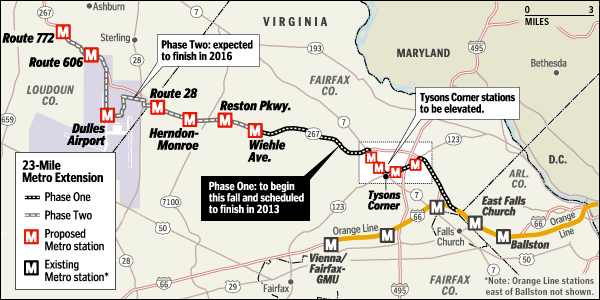 They said this day would never come. Back in January, rail to Dulles was all but dead. Yet, incredible as it may seem, FTA today approved the first phase of the project.
They said this day would never come. Back in January, rail to Dulles was all but dead. Yet, incredible as it may seem, FTA today approved the first phase of the project.
A major hurdle has been cleared for the long-planned Metrorail expansion to Dulles International Airport.The Federal Transit Administration has approved the first phase of the $5.2 billion project, essentially reversing the agency's warning earlier this year that the project might be killed.
[...]
The 23-mile expansion, which will be called the Silver Line, would be built in two stages. The first phase will run from Falls Church to Wiehle Avenue. The second phase will stretch out to Dulles International Airport and Loudoun County.
This is a huge step forward for Rail to Dulles. Now this is the unfortunate above ground project, but it's $900 million in federal funding for a critical project which will profoundly change the transportation reality for the Washington exurbs. This is a huge coup for Tim Kaine, and like it or lump it, if Transportation Secretary Mary Peters signs it, OMB can give formal approval and ground may break on the project immediately after.
Crosspost at BlueCommonwealth.com
"This latest development in the ongoing battle to bring transit rail service to Tysons Corner and Dulles is great news for Virginians from every corner of the Commonwealth. In this time of economic crisis, now is exactly the right time to invest in public infrastructure projects--especially projects that will relieve traffic congestion and foster continued economic growth."We will only move forward--together, as one Commonwealth--to address our economic and transportation woes through the same spirit of bipartisan cooperation that made this project possible. I commend the leadership of Governor Kaine and our congressional delegation. In the face of resistance from Administration officials in Washington they persevered, successfully making the case that this project is vital to the continued economic success of our Commonwealth.
Wouldn't it make more sense to connect Loudoun County (and maybe even Dulles) to the current Metrorail system via a high-speed commuter rail, or do we really think people are going to abandon their cars for a 2 hour train ride into the city (it takes approx. 30 mins to get from Van Dorn to L'enfant Plaza, do the math for Loudoun County). And while I agree that connecting the Reston corridor to the Metrorail is something that should be considered, unless/until there is a matching above-ground light rail or adequate passenger bus system that fully integrates Reston Town Center and other locales into a transportation grid, it seems less than ideal to me.
Personally, I think that we need to re-envision the entire transit approach to the region, and then clearly about who is traveling into and out of Tysons before we start this mess.
Where is the leadership that can drive some responsible decision-making on these issues? Tysons and its surrounding environs are currently parts of all three NoVa CDs. All of the stakeholders for our transportation future need to be brought together to come up with a master plan for addressing the transportation needs of the various corridors in NoVa -- members of Congress, state legislators, state executives, county boards, and citizen activists -- so that we don't make any stupid decisions. The federal government will be turning over lots of cash for infrastructure building in the next few years, let's be ready and have a list of projects that would help NoVa grow more responsibly and effectively and in an environmentally sound way. Where is the leadership?
I would be interested in expanding stops all over the District as well as Virginia and Maryland. Put in overlapping express lanes and then connect the outer limits by high-speed rail with room to expand.
Metro is reasonably well designed only for the inner core of DC, and much of the city is not covered at all.
We need to examine how to make the overall system more effective, more redundant, and more flexible, so that cars really become optional (or hopefully unnecessary) for at least the inner urban core (including all of Arlington, Alexandria, Falls Church, and inside the Beltway on the VA side).
I very much agree with your express train idea. We also need to make sure we understand exactly wherefrom and whereto the vast majority of commuters are coming/going before we try and design a system, and then figure out how to control growth density going forward.
Again, this is complicated, but not rocket science. Where is the leadership?